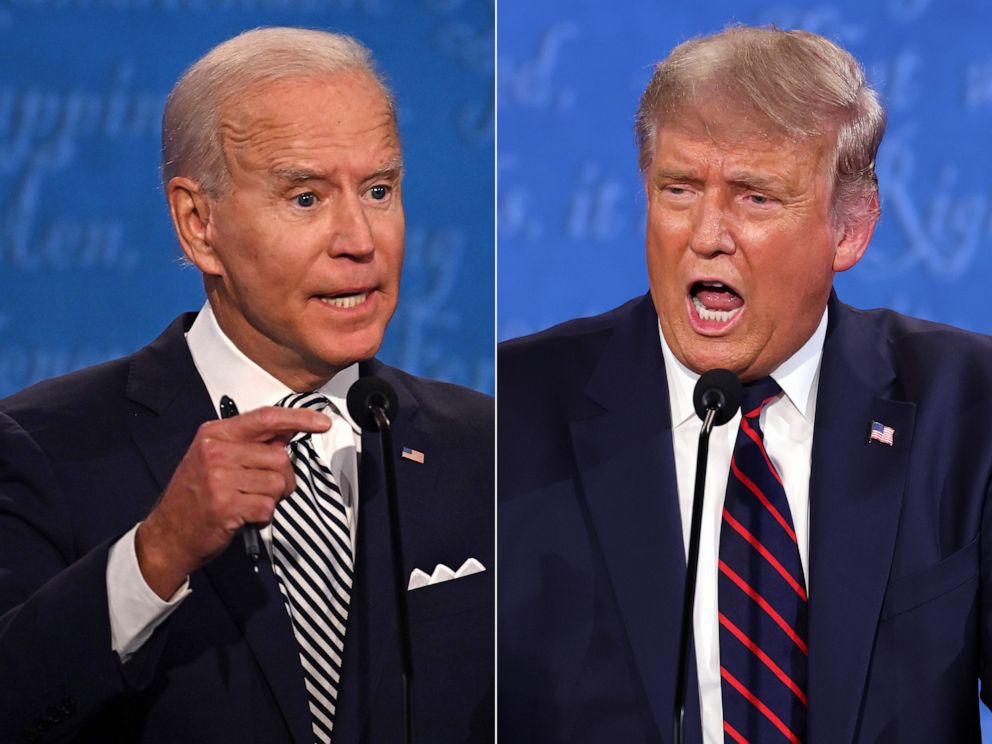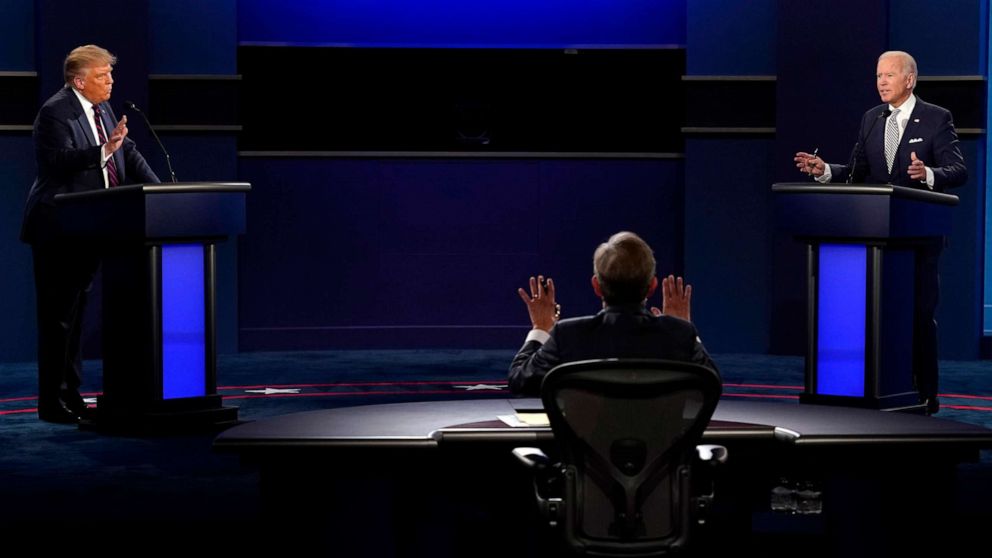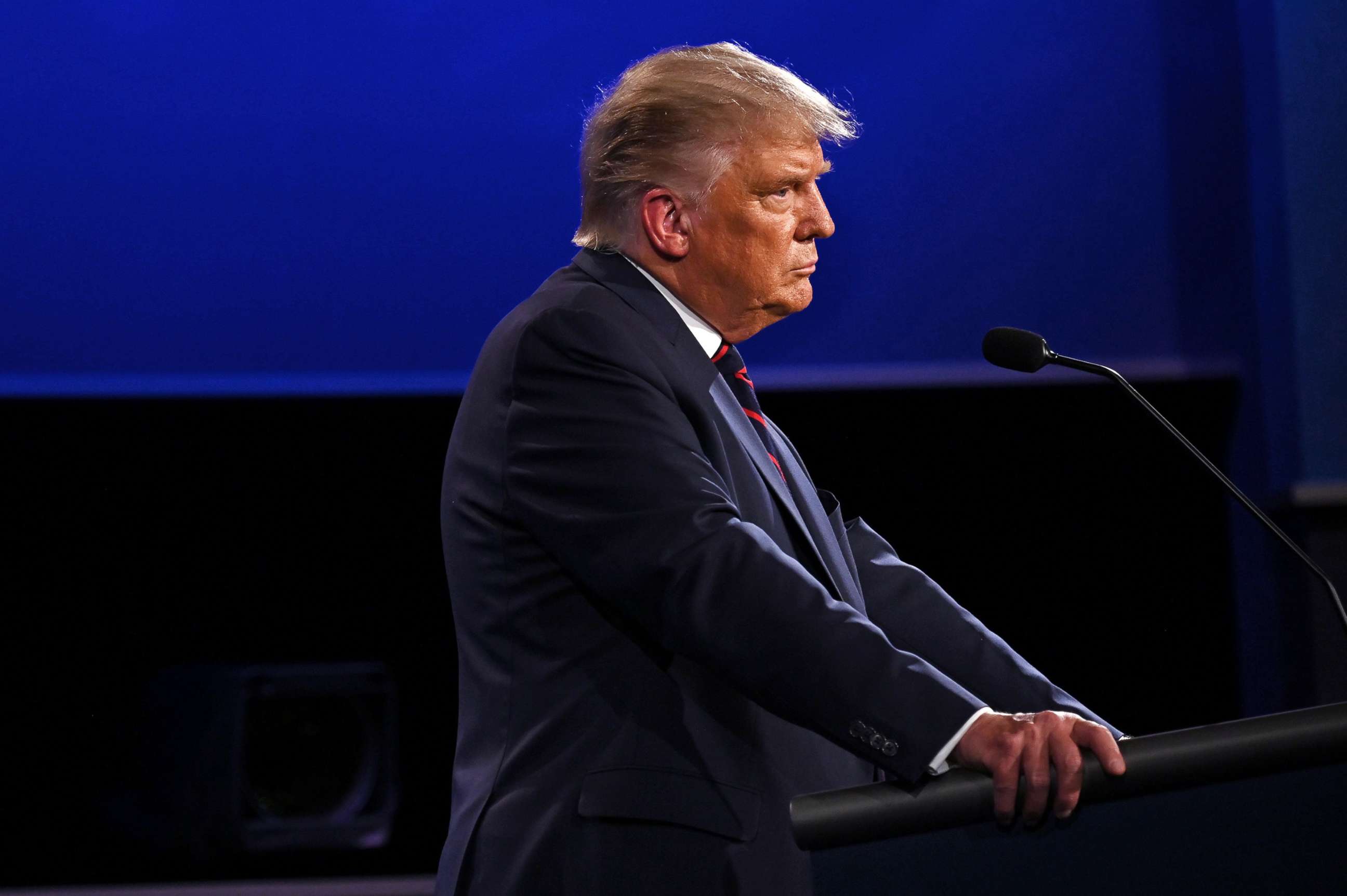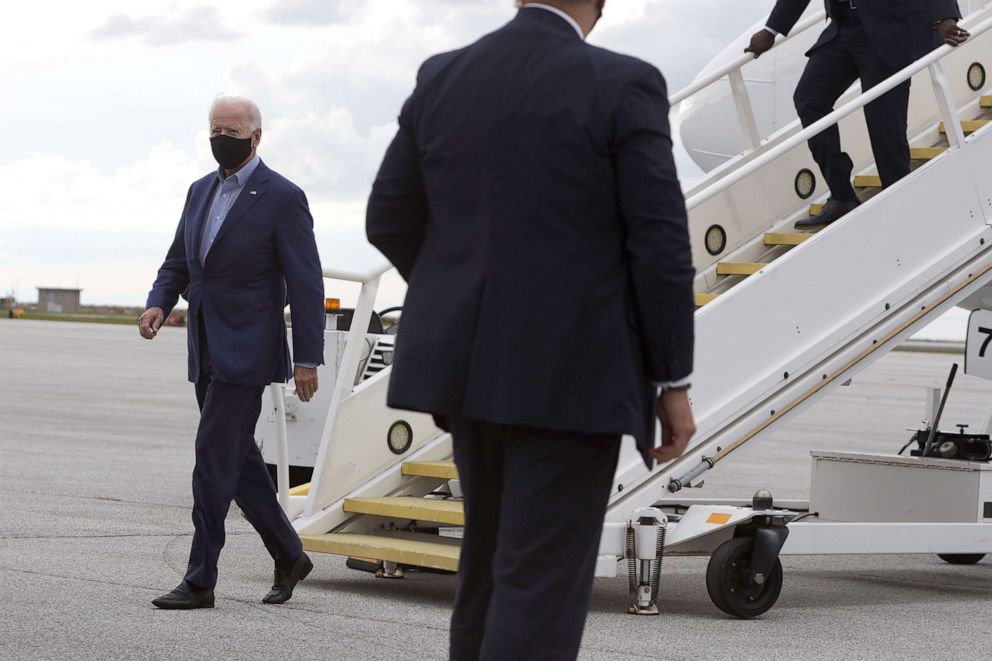The Note: Trump uses debate to sow mistrust in voting process
It was a disjoined affair where Biden and Trump insulted more than explained.
The TAKE with Rick Klein
The man a rival once warned would be a "chaos president" got a chaotic debate -- a wildly disjoined affair where both candidates insulted more than they explained.
But almost as a throwaway topic, late in the debate, a discussion about election integrity drew critically important messaging out of the noise of this year's first presidential debate of the general election.

President Donald Trump unfurled a wide range of false and misleading claims about the realities of voting in this country -- voting that, of course, has already begun.
He put more detail behind his refusal to commit to respecting the results of the election.
"If I see tens of thousands of ballots being manipulated, I can't go along with that," Trump said. "It means you have a fraudulent election."
It could wind up being the most consequential moment from a messy 90-plus minutes of arguments and innuendo.

Trump urged his supporters to serve as "poll watchers" and report back on what they find, a situation that could lead to voter intimidation as well as raise doubts about the election's legitimacy.
It's already being said that the first debate served neither candidate particularly well. But this was a clear signal from the president, who has taken a fragile moment around the election and made it potentially dangerous.
The RUNDOWN with MaryAlice Parks
It was a stark headline in a blur of words. Asked repeatedly and calmly if he would condemn white supremacists who have contributed to increased violence nationwide under this administration, Trump side-stepped and balked.
"Are you willing tonight to condemn white supremacists, militia groups and to say that they need to stand down and not add to the violence in a number of these cities, as we saw in Kenosha and as we've seen in Portland?" debate moderate Chris Wallace asked.
"Sure, I'm willing to do that," the president responded. But then, nothing. He did not.
"Do it," former Vice President Joe Biden urged Trump.
"Go ahead, sir," Wallace added, waiting.

The president pivoted and went back on the offensive, blaming what he sees as radicals "from the left wing." His silence Tuesday -- after his comments on Charlottesville, Virginia, after his attacks on Black journalists, Black athletes and Black protesters -- were part of a chilling and disturbing trend.
This president so frequently has accepted praise from extremists and perpetuated hurtful, racist discourse and theories in this country. More, the president went on to name-check but not condemn a specific white nationalist group, telling them to "stand back and stand by."
Stand by for what was not clear, but the ramifications felt violent and frightening. The president of the NAACP, Derrick Johnson, responded Tuesday night, saying: "We must never stop being outraged by this."
The TIP with John Verhovek
Biden may have debuted a new campaign plane on debate day, but on Wednesday he's returning to the mode of transportation he's been associated with his entire career.
The Democratic nominee, a noted Amtrak enthusiast, will embark on a nearly 200-mile whistle stop train tour through Ohio and Pennsylvania, campaigning in areas full of voters that strayed from his party in the last decade and powered Trump's unlikely rise to the White House.

Stark County, Ohio, the site of the first stop on the tour, backed Barack Obama by over five points in 2008, but sided with Trump by 17 points in 2016. Cambria County, Pennsylvania, where Wednesday's tour concludes, narrowly backed Obama in 2008 but has swung drastically back to the GOP since, siding with Trump by roughly 37 points in 2016.
The former vice president may not flip these counties blue in 2020, but cutting into Trump's margin in the towns his campaign trail will roll through is a key part of how Democrats plan to rebuild the so-called "Blue Wall" in the Midwest that collapsed in 2016.
ONE MORE THING
President Donald Trump and Democratic nominee Joe Biden struggled to break through their own noise on Tuesday night in the first presidential debate, which was filled with interruptions, arguing and incoherent pitches to American voters. Here are five key takeaways from the first of three presidential debates.
THE PLAYLIST
ABC News' "Start Here" podcast. Wednesday morning's special edition of 'Start Here' features ABC News Chief National Affairs correspondent Tom Llamas and ABC News Deputy Political Director MaryAlice Parks – the two break down the moments that mattered from Tuesday night's presidential debate. Then ABC News contributors Sara Fagen and Heidi Heitkamp analyze how President Donald Trump and former Vice President Joe Biden's performances could affect the race. http://apple.co/2HPocUL
ABC News' "Powerhouse Politics" podcast. Authors Corey Lewandowski and David Bossie talk with ABC News Political Director Rick Klein and Chief White House Correspondent Jonathan Karl about their new book, "Trump: America First: The President Succeeds Against All Odds" and the first presidential debate. https://bit.ly/2w091jE
WHAT YOU NEED TO KNOW TODAY
- Sen. Bernie Sanders, I-Vt., appears on ABC's "The View."
- Judge Amy Coney Barrett continues to meet with senators as part of the confirmation process for the Supreme Court. She meets with Sen. Mitt Romney at 9 a.m., Sen. Todd Young at 10 a.m., Sen. Mike Braun at 11 a.m., Sen. David Perdue at 11:30 a.m., Sen. John Kennedy at 12 p.m., Sen. Shelley Capito at 2 p.m. and Sen. Thom Tillis at 3:45 p.m.
- At 10 a.m., the Senate Judiciary Committee will hold a hearing on the counterintelligence investigation "Crossfire Hurricane." Former FBI director James Comey is expected to testify.
- Attorney General William Barr will visit Cherokee Nation in Tahlequah, Oklahoma, and lead a roundtable discussion at 10:30 a.m.
- Doug Emhoff virtually travels to New Hampshire where he will participate in virtual tours. At 11:30 a.m., he tours and has a conversation with Revision Energy and Brown & Company. Later, he will launch a phone bank with Granite Staters at 5:30 p.m.
- Biden and former second lady Jill Biden embark on a campaign train tour across eastern Ohio and western Pennsylvania. They will make stops in Alliance, Ohio, Pittsburgh and Greensburg, Pennsylvania. Then, they will attend an event in New Alexandria, Pennsylvania. Afterward, they will stop in Latrobe, Pennsylvania, and will end their tour in Johnstown, Pennsylvania, where they both will deliver remarks. The train tour will launch at 9:45 a.m. At 8 p.m., Biden will host a Racism as a Religious Issue event with a panel including Sen. Chris Coons, the Rev. Jim Wallis and others.
- Trump travels to Minnesota and participates in a fundraising committee reception at 5:30 p.m. CDT. At 8 p.m. CDT, he delivers remarks at a campaign event in Duluth, Minnesota.
- Vice President Mike Pence travels to Atlanta where he participates in a roundtable at 1 p.m. and will deliver remarks at 2:30 p.m.
Download the ABC News app and select "The Note" as an item of interest to receive the day's sharpest political analysis.
The Note is a daily ABC News feature that highlights the key political moments of the day ahead. Please check back tomorrow for the latest.




